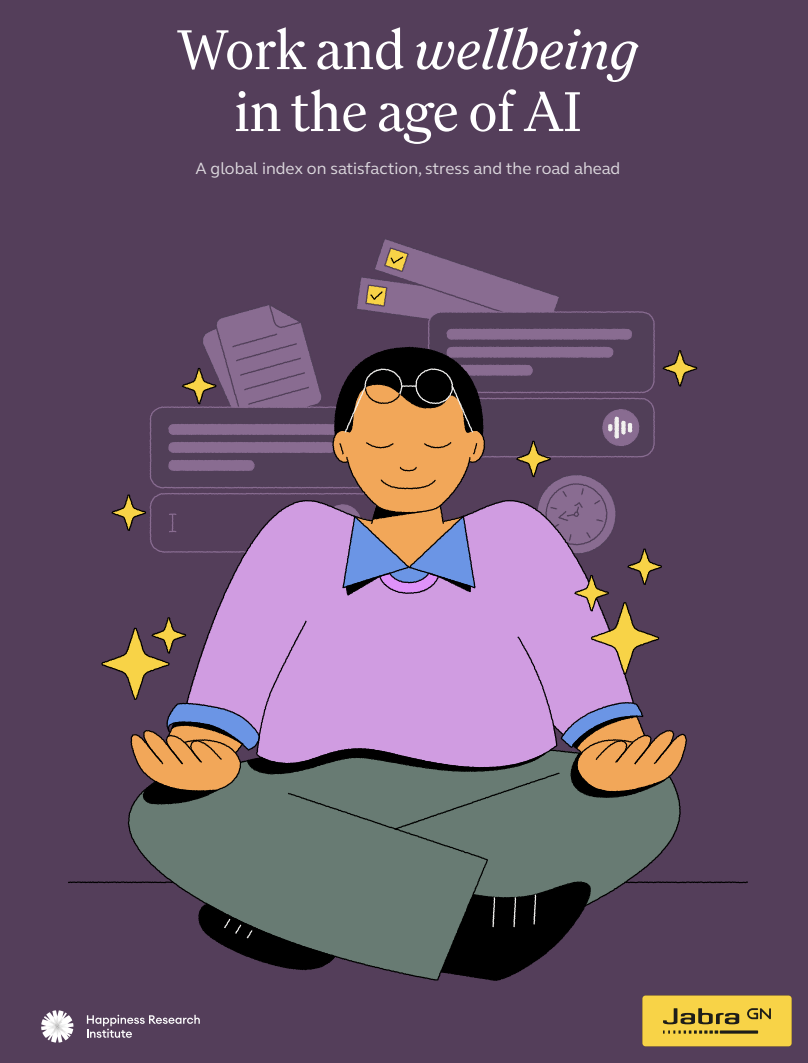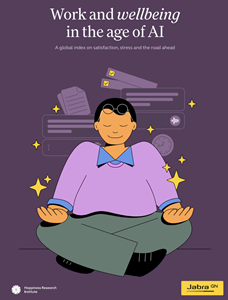AI at Work: New Global Study Links AI to Greater Happiness

- Workers who use AI daily are 34% more satisfied with their jobs and feel more optimistic about the future.
- Job satisfaction strongly influences life satisfaction with happy employees 4.5 times more likely to feel happy in life.
- AI users report higher fulfilment as two-thirds of those with high job satisfaction also report high satisfaction in life.
- Paradoxically, frequent AI users are also likely to be up to 20% more stressed, as well as more concerned about their job security.
LOWELL, Mass., June 24, 2025 (GLOBE NEWSWIRE) -- Jabra, the world’s leading professional audio brand, today released the results of new research exploring whether AI can do more than just improve efficiency. This global study conducted in partnership with The Happiness Research Institute examines the connection of GenAI with wellbeing at work, and in everyday life. The data shows that while much of the conversation about AI has centered on efficiency, the real opportunity may lie in something far more human: happiness.
The study, Work and Wellbeing in the Age of AI, surveyed over 3,700 knowledge workers1 across 11 countries and provides a first-of-its-kind look at how the growing use of AI tools is influencing job satisfaction, stress levels and life happiness.
The link between AI and wellbeing
The research reveals a clear correlation between frequent AI use and elevated job satisfaction. Workers who use AI daily report being 34% more satisfied with their roles compared to those who do not. They report stronger goal achievement (78% of frequent AI users vs. 63% of infrequent AI users) and more opportunities for advancement (70% of frequent AI users vs. 38% of infrequent AI users) than those who use AI just once a week or less.
Similarly, compared with workers who don’t use AI regularly, frequent AI-users are more optimistic about their future job satisfaction (47% vs. 27%), and more confident that their work will remain enjoyable (44% vs. 23%) and fulfilling (45% vs. 24%). In conclusion, individuals using AI frequently are significantly more likely to experience a stronger sense of purpose and feel optimistic about the general future of work.
Meik Wiking, CEO of The Happiness Research Institute and author of The Little Book of Hygge explains, “It’s easy to talk about AI in terms of productivity. But we need to start talking about it in terms of psychology. How it affects identity, motivation and what people believe their future looks like. The future of work isn’t just technological — it’s emotional.”
Why workplace wellbeing matters
The findings indicate that workplace wellbeing is closely linked to broader life satisfaction. Employees who are happy at work are 4.5 times more likely to report being satisfied with life overall. Two-thirds of those who report high job satisfaction also describe themselves as happy in their personal lives.
Paul Sephton, Global Head of Brand Communications at Jabra, commented: "We need to understand how technology and wellbeing intersect. As we engineer products, we are innovating for a future where people collaborate not just with other people, but also with AI. This shift means evolving our solutions to support not only human interaction, but also to enable AI systems with the audio and video input they need to be more helpful, more contextual and more emotionally intelligent.”
How we use AI also linked to stress
While the overall sentiment around AI is positive, the study notes, paradoxically, that frequent AI users also report 20% higher levels of stress than infrequent users. This could be driven by the pressure to master new tools, craft the “right” prompts, and continuously adapt to evolving systems. Some of this strain may also come from the added mental load of reviewing and interpreting AI-generated outputs. Workers not only have to use these tools but also stay vigilant, double-checking results and making judgment calls more frequently.
However, all stress is not equal. Workers who report slightly elevated stress levels (those who feel stretched but not overwhelmed) report higher purpose, greater happiness, and stronger satisfaction at work than those with moderate or neutral stress levels. In these cases, stress may be a proxy for engagement: a sign that workers are invested, motivated, and challenged in ways that feel meaningful.
Big opportunity in AI deployment
Despite the hype around AI, the majority of workers are still not using it regularly. In fact, nearly one-third of high-skilled professionals have never used AI at work. Among those who do, flexibility appears to be a defining factor. Workers are engaging with AI across a wide variety of inputs, from typing to using voice prompts, and using it for diverse tasks in multiple environments. This suggests a critical moment for businesses: AI has the potential to both support and detract from wellbeing. What organizations choose to do now will shape how successfully their workforce can adapt and thrive in the future.
This study signals a new frontier for businesses navigating the integration of AI. Rather than focusing solely on efficiency, Jabra and The Happiness Research Institute suggest that the emotional experience of work must become a design priority. As AI becomes a regular part of the workplace, there is growing potential to build environments that foster both productivity and wellbeing.
Download the full report at www.jabra.com/happinessresearch
Note to Editors
1 Knowledge workers are defined as professionals whose roles rely on skills such as communication, critical thinking and managing information, including but not limited to office workers like analysts, consultants, marketers and customer support specialists.
PR Contact
Hayley Minardi
hminardi@jabra.com
About Jabra
Jabra is a world leading brand in audio, video, and collaboration solutions – engineered to empower businesses. Proudly part of the GN Group, we are committed to bringing people closer to one another and to what is important to them. GN’s R&D team utilizes innovative hardware, software, and AI-enabled technologies and expertise across hearing, enterprise, and gaming product groups. This engineering excellence allows Jabra to create integrated and customer-centric tools for call centers, offices, and collaboration to help professionals work more productively from anywhere. www.jabra.com
Founded in 1869, GN Group employs more than 7,000 people and is listed on Nasdaq Copenhagen (GN.CO). GN's solutions are sold in 100 countries across the world. Visit our homepage GN.com.
© 2025 GN Group. All rights reserved. Jabra® is a registered trademark of GN Group. All other trademarks included herein are the property of their respective owners (design and specifications are subject to change without notice).
A photo accompanying this announcement is available at https://www.globenewswire.com/NewsRoom/AttachmentNg/95dd8129-a639-40c6-85cf-c839cd39c231

Legal Disclaimer:
EIN Presswire provides this news content "as is" without warranty of any kind. We do not accept any responsibility or liability for the accuracy, content, images, videos, licenses, completeness, legality, or reliability of the information contained in this article. If you have any complaints or copyright issues related to this article, kindly contact the author above.


